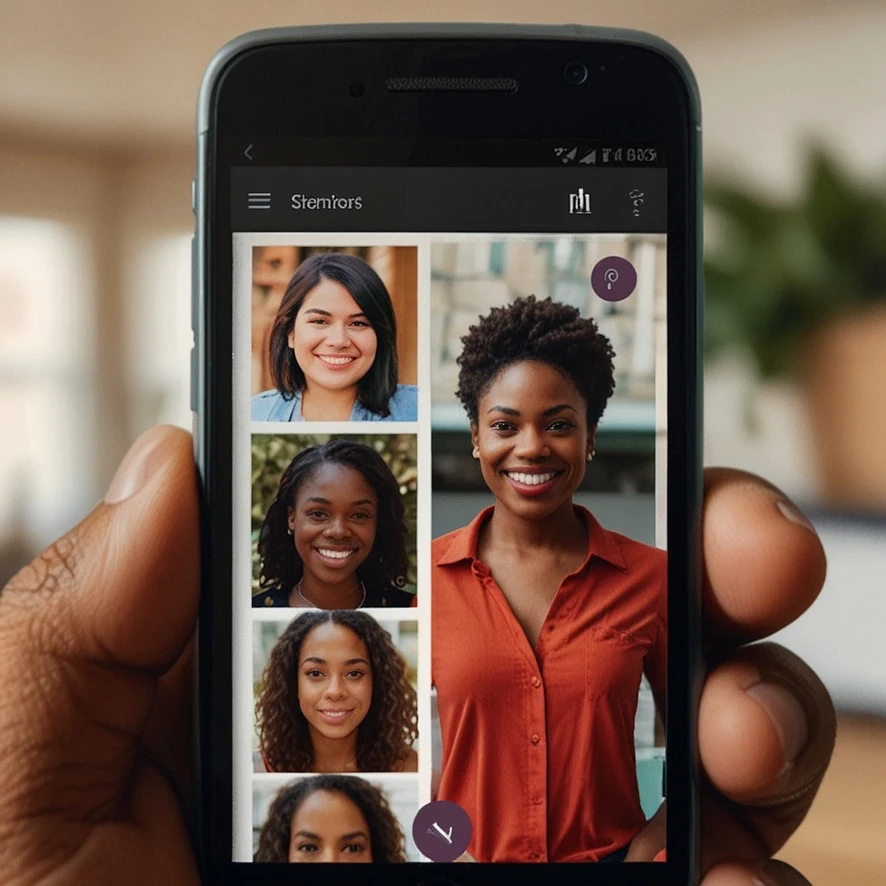Understanding Florida’s Sexual Cyberharassment Law
Are you under investigation or charged with Sexual Cyberharassment (Florida Code 784.049) in Florida? Call our Florida criminal defense lawyers at 1-800-921-8607 for a free consultation.
“Your career, reputation, and freedom hang in the balance. A single misstep could derail everything you’ve worked for. This isn’t just a legal matter; it’s a fight for your future.” (Michael Waddington, Florida Criminal Defense Lawyer).
What is Sexual Cyberharassment in Florida?

Florida Sexual Cyberharassment Defined?
Sexual cyberharassment involves the publication or dissemination of sexually explicit images of a person without their consent. This can include images shared on Internet websites or through electronic means. The Florida Legislature acknowledges that even if a person initially consented to creating such an image, they might still expect it to remain private. Unfortunately, these images are often shared without consent, causing significant emotional distress to the depicted individuals.
“A person depicted in a sexually explicit image taken with the person’s consent may retain a reasonable expectation that the image will remain private despite sharing the image with another person, such as an intimate partner.”
Florida Statutes 784.049(1)(a)
Definitions and Terms
The law defines several key terms:
- Image: Any photograph, picture, motion picture, film, video, or representation.
- Personal identification information: Information that identifies an individual, such as name, address, telephone number, or social security number.
- Sexually cyberharass: To publish or disseminate a sexually explicit image of a person without their consent, aiming to cause substantial emotional distress.
- Sexually explicit image: Images depicting nudity or sexual conduct.
Legal Consequences
Those found guilty of sexual cyberharassment face serious penalties:
- A first-time offender commits a misdemeanor of the first degree.
- A repeat offender commits a felony of the third degree.
“A person who willfully and maliciously sexually cyberharasses another person commits a misdemeanor of the first degree.”
Florida Statutes 784.049(3)(a)
Law Enforcement and Civil Remedies
Law enforcement officers can arrest individuals without a warrant if they have probable cause. Additionally, affected individuals can pursue civil actions for injunctive relief, monetary damages, and attorney fees.
“An aggrieved person may initiate a civil action against a person who violates this section to obtain all appropriate relief in order to prevent or remedy a violation of this section.”
Florida Statutes 784.049(5)
Exemptions
The statute exempts certain parties from these penalties, including service providers that transmit or store electronic communications and law enforcement officers performing their duties.
Hiring a Florida Criminal Defense Lawyer to Defense 784.049 Sexual cyberharassment
The 2023 Florida Statutes on sexual cyberharassment aim to protect individuals’ privacy and psychological well-being by imposing strict penalties on those who violate these laws. Understanding these statutes is crucial for both potential victims and the general public to ensure privacy and emotional safety in the digital age.
How a Florida Criminal Defense Lawyer Can Help with Sexual Cyberharassment Allegations
Sexual cyberharassment, under Florida Statute 784.049, is a serious charge that can have lasting repercussions on an individual’s life. Allegations of this nature can lead to criminal charges, social stigma, and personal distress. In such situations, the expertise of a Florida criminal defense lawyer becomes indispensable. This article will explore how criminal defense attorneys in Florida can assist those accused of sexual cyberharassment.
Understanding the Charge
Sexual cyberharassment involves the non-consensual publication or dissemination of sexually explicit images of another person with the intent to cause substantial emotional distress. It is crucial to understand the specific elements of this charge:
- Non-consensual sharing: The image must be shared without the depicted person’s consent.
- Intent: The intent behind sharing the image must be to cause substantial emotional distress.
- Identification: The image must include personal identification information that connects it to the depicted person.
Initial Consultation and Case Evaluation
When facing an allegation of sexual cyberharassment, the first step is to consult with a Florida criminal defense lawyer. During the initial consultation, the lawyer will evaluate the case details, including the evidence presented, the context of the alleged offense, and any prior criminal history. This evaluation is crucial in formulating a defense strategy tailored to the case’s specifics.
“A thorough evaluation of the evidence and circumstances surrounding the alleged offense is the cornerstone of an effective defense strategy.”
Formulating a Defense Strategy
Criminal defense attorneys in Florida utilize various defense strategies to protect their clients. These strategies may include:
- Challenging the Evidence: The lawyer will scrutinize the evidence to identify any inconsistencies or procedural errors. This can involve questioning the image’s authenticity, the methods used to obtain it, and the chain of custody.
- Consent: Demonstrating that the depicted person consented to the distribution of the image can be a potent defense. Evidence that the individual had previously shared the image voluntarily can help in this regard.
- Lack of Intent: The prosecution must prove that the intent behind sharing the image was to cause substantial emotional distress. If the defense can show that there was no malicious intent, this can significantly weaken the prosecution’s case.
Negotiating Plea Deals

Representation in Court
If the case goes to trial, a Florida criminal defense lawyer will provide robust representation in court. This includes presenting evidence, cross-examining witnesses, and making compelling arguments to the jury. The lawyer’s experience and skill in the courtroom are vital in achieving a favorable outcome for the defendant.
“Effective courtroom representation can make the difference between a conviction and an acquittal.”
Post-Trial Support
Even after the trial, a Florida criminal defense lawyer can continue to provide support. This may involve filing appeals if the verdict is unfavorable or assisting with expunging the record if the charges are dismissed. The goal is to mitigate the long-term impact of the allegations on the client’s life.
Protecting Your Rights and Future
An allegation of sexual cyberharassment can be overwhelming, but a skilled Florida criminal defense lawyer can provide the guidance and defense necessary to protect your rights and future. By understanding the nuances of the law and employing strategic defense tactics, these legal professionals work tirelessly to ensure that justice is served and that their clients receive a fair trial.
If you or someone you know is facing such allegations, it is crucial to seek the assistance of a competent Florida criminal defense lawyer as soon as possible. Early intervention can significantly affect the outcome of the case.
Below are Fictional Examples of Florida Code 784.049 – Sexual cyberharassment
- Fact Pattern: Jack, a Miami Beach resident, shares explicit images of his ex-girlfriend without her consent on social media after a nasty breakup, intending to humiliate her.
- Possible Defense: A Florida criminal defense lawyer might argue that Jack did not intend to cause substantial emotional distress or challenge the authenticity and source of the images.
- Fact Pattern: Lisa from Orlando receives a nude photo from her boyfriend and, in a fit of jealousy, sends it to his coworkers, resulting in his severe emotional distress.
- Possible Defense: A Florida criminal defense attorney could argue that Lisa did not disseminate the photo with malicious intent or that there is insufficient evidence linking her to the act.
- Fact Pattern: Tom, a college student in Gainesville, uploads a sexually explicit video of his classmate to a popular adult website after she rejected his advances.
- Possible Defense: A Florida criminal defense lawyer could challenge the prosecution’s ability to prove that Tom uploaded the video or that he had the intent to cause emotional harm.
- Fact Pattern: Samantha, a Tampa nurse, posts a naked photo of her cheating husband on an online forum, which quickly goes viral.
- Possible Defense: A Florida criminal defense attorney might argue that the post was an impulsive act made without the intent to cause long-term distress and seek to demonstrate the lack of premeditation.
- Fact Pattern: Mark from Fort Lauderdale shares an intimate video of his ex-boyfriend with mutual friends after a heated argument, causing significant distress to the ex-boyfriend.
- Possible Defense: A Florida criminal defense lawyer could argue that the video was shared in a private context without the intent of public dissemination or severe distress.
- Fact Pattern: Emily, a social media influencer in Jacksonville, posts a risqué photo of a fellow influencer during a feud to tarnish her rival’s reputation.
- Possible Defense: A Florida criminal defense attorney might challenge the evidence linking Emily to the post or argue that there was no malicious intent to cause emotional harm.
- Fact Pattern: Brian, a Clearwater businessman, sends an explicit photo of his ex-girlfriend to her family members to get back at her for ending their relationship.
- Possible Defense: A Florida criminal defense lawyer could argue that Brian did not intend for the image to be seen as malicious or contest the credibility of the accuser’s claims.
- Fact Pattern: Jessica from Tallahassee hacks into her ex-roommate’s cloud account and posts intimate photos on a public forum.
- Possible Defense: A Florida criminal defense attorney might argue that the evidence of hacking is circumstantial and cannot definitively prove Jessica’s involvement.
- Fact Pattern: Mike, a St. Petersburg bartender, shares a compromising video of his coworker during a company party, leading to her emotional breakdown.
- Possible Defense: A Florida criminal defense lawyer could argue that the video was shared as a joke and not with the intent to cause substantial distress or damage.
- Fact Pattern: Rachel, a West Palm Beach lawyer, emails nude photos of her ex-boyfriend to his new girlfriend to sabotage their relationship.
- Possible Defense: A Florida criminal defense attorney could argue that Rachel’s actions, while inappropriate, were not intended to cause severe emotional distress or long-term harm.
- Fact Pattern: David from Naples shares a sexually explicit image of his former partner on an anonymous blog, which goes viral.
- Possible Defense: A Florida criminal defense lawyer could argue that David had no control over the image going viral and did not intend to cause widespread distress.
- Fact Pattern: Laura, a Key West artist, includes an explicit photo of her ex-lover in an art exhibit without his consent, causing him public embarrassment.
- Possible Defense: A Florida criminal defense attorney might argue that the photo was used as artistic expression without the intent to cause substantial emotional distress.
- Fact Pattern: Ethan, a Daytona Beach photographer, posts private images of his former client on his website after a payment dispute.
- Possible Defense: A Florida criminal defense lawyer could argue that Ethan was attempting to resolve a business matter and did not intend to cause personal emotional harm.
- Fact Pattern: Olivia from Sarasota sends a compromising video of her ex-husband to his boss, leading to his emotional and professional downfall.
- Possible Defense: A Florida criminal defense attorney could argue that Olivia acted out of temporary anger without the calculated intent to cause lasting emotional distress.
- Fact Pattern: Jake, a Pensacola musician, includes a naked photo of his ex-girlfriend in his latest music video as a form of revenge.
- Possible Defense: A Florida criminal defense lawyer might argue that the image was included for artistic purposes and not to cause intentional harm or distress to his ex-girlfriend.
In each case, a Florida criminal defense lawyer can challenge the intent behind the alleged cyberharassment, question the authenticity and source of the images, and argue against the severity of emotional distress claimed by the accuser. A Florida criminal defense attorney can also seek to demonstrate that the dissemination of the images lacked malicious intent and that the actions of the accused were either impulsive or misinterpreted, aiming to secure a favorable outcome for their client.
